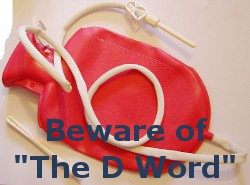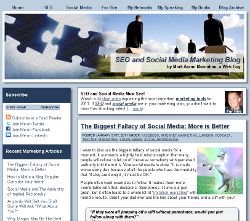
Even Ma and Pa Kettle Demand Targeting
I spoke with a friend recently who said that his target market is “everybody”. He didn’t just say it, but he actually meant it, and even defended it. What’s astonishing to me is that he actually fancies himself an Internet marketing professional.
Now, I’m not calling my friend an idiot. There are a lot of great rocket scientists, school teachers, surgeons, firemen, and others who do not understand marketing. We cannot all know everything, and the fine details of marketing are certainly not something everybody wants or needs to understand.
My friend is in the business of building websites, but this applies to any company, of any size, in any industry.
His belief was that since “anybody” may need a website, that he didn’t want to miss any of them by segmenting his market. In his mind, I guess he just didn’t want to leave anybody out. So, he is running Google ads directed at a massive audience.
I am a marketing professional, so you can probably imagine my head exploding at this point, right? I tried to suggest targeting specific segments which had historically been good customers to him. I tried to suggest taking a careful eye toward A/B testing to discover the audience with the highest response rate. I was shot down with every point I tried to make. I guess he was feeling generous with his ad budget, but he turned me down when I suggested he just drop it in the mail to me as a gift. I mean, he is wasting money either way … why not?
Maybe you never heard this before, or maybe you just shook your head in disbelief when you heard it, but I have an extremely valuable message for you. If you believe, like my friend, that your marketing should be directed to everybody, I hope you will accept this small piece of valuable advice.
Market Segmentation is Essential to Success in Marketing
There is a basic principle of marketing that is a cornerstone of success, and that is “Everybody” is Not a Target. Not now, not ever, and not for any company of any size, in any industry! Whether it is Pepsi Cola, McDonald’s, or any other product or service, market segmentation is a foundation-level component to success of any marketing campaign. Even if you are selling water or air, there is always a good, better, and best market segment for your offering.
If you are trying to market to anybody or everybody, you are missing the portion of that “everybody” who will become your most valuable assets. You will waste huge amounts of marketing resources by trying to reach an unsegmented market. Those marketing resources are precious! They include two of the most important components of business: time and money. So why would anybody waste these?
Let’s just assume for a moment that there is actually something which includes a market potential of anybody or everybody. Doesn’t it make more sense to reach the ones who are more likely to become a customer? Doesn’t it make sense to reach the ones who have a better reason to buy, or who are more appropriate for your offering? What about targeting the market of people who are actively in the market for what you offer?
There are enough reasons to segment your market to fill textbooks, but here is just one to consider: If you target the right market segment, it is far more likely to find customers who will become brand loyal and tell all of their friends.
In the case of this individual, shouldn’t he target something, rather than everything? What about new companies, companies that just changed names, merged, or are under new management? What about the people who need a website more than grandma does? If you sell $599 “economy websites”, would it make sense to spend money to reach people who need a $250,000 website … or the other way around?
I tried to use common sense to explain the importance of targeting a segment. I explained that McDonald’s knows to focus on specific targets, and if there was ever a company who could sell something to everybody, they are in the running. They target kids. They target busy people on their lunch break. They target single moms who worked all day and just can’t tolerate another dirty dish. Is it possible that they grew so large with a worldwide recognition just by marketing to everybody? No, it may look like that on the surface, but it is absolutely not the case!
If you are marketing to an audience of “everybody”, your message will suffer. It will not resonate with the person seeking to buy. It will become boring. It will also cost many times more money and effort to achieve the same result.
Are you targeting the right people, or do you still want to sell office furniture to retired people? They may buy, but the results will not be as favorable.
If you have read my blog before, you have likely noticed that my message often addresses the huge importance of targeting a market rather than shooting into the wild. I am going to add a few related links below just to make the point clear. Each of them has a message of the importance of targeting and its huge impact on return on investment.
Please share your thoughts on this topic. It may help somebody else, or it may help you!
- Social Media Marketing is More Than Social Networking
- Facebook Marketing: Pages, Customer Modeling, Promoting, and Awesomeness
- Social Media ROI, Marketing Cost, and the Willingly Confused
- Target Your Marketing and Love Your Customers Again
- Marketing ROI Factor: Are You a Client or a Customer?
- SEO and Conversion: Increasing Website Traffic is Only Part of SEO
- Google Website Marketing: How to Improve Website Traffic
- Will Your Social Media Noise Withstand 2011 Filtering?
- SEO Lateral Keywords
Podcast: Play in new window | Download





